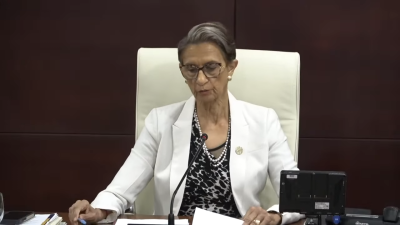 PHILIPSBURG:--- In a pivotal address marking the close of the 2024–2025 Parliamentary year, Chairlady of Parliament Sarah Wescot-Williams unveiled a series of bold constitutional reform initiatives aimed at enhancing accountability and strengthening the democratic framework of Sint Maarten. Delivered on Monday, September 8, her speech underscored the urgent need for structural changes to ensure a more effective and transparent Parliament.
PHILIPSBURG:--- In a pivotal address marking the close of the 2024–2025 Parliamentary year, Chairlady of Parliament Sarah Wescot-Williams unveiled a series of bold constitutional reform initiatives aimed at enhancing accountability and strengthening the democratic framework of Sint Maarten. Delivered on Monday, September 8, her speech underscored the urgent need for structural changes to ensure a more effective and transparent Parliament.
Central to her proposals are amendments to Article 59, which governs the dissolution of Parliament, and the operationalization of Article 33, which regulates motions of no confidence. These reforms, Wescot-Williams emphasized, are critical to aligning parliamentary processes with the original intent of the Constitution and fostering greater trust in governance.
Reforming Article 59: Dissolution of Parliament
Wescot-Williams announced the submission of her long-discussed initiative to amend Article 59, which currently allows Parliament to be dissolved by national decree. She highlighted the need for a comprehensive review of this provision, stating, “Application of Article 59 currently is not keeping with the spirit of how it was put in our Constitution. Parliament must have this discussion.”
A start note has been prepared to outline the rationale and options for reform, ensuring that the dissolution of Parliament is used judiciously and in alignment with democratic principles. The proposed changes aim to prevent misuse of this mechanism and to safeguard the stability of Sint Maarten’s parliamentary system.
Operationalizing Article 33: Motions of No Confidence
Equally significant is Wescot-Williams’ push to operationalize Article 33, which governs motions of no confidence. While the Constitution mandates that ministers who lose Parliament’s confidence must resign, the procedural steps for implementing such motions remain undefined.
“Motions must not remain paper declarations,” Wescot-Williams asserted. “Parliament must move from motion to materialization, from request to result. They must be intentional, balanced, and most of all realistic.” By drafting an ordinance to detail the application and procedural steps of no-confidence motions, the Chairlady aims to ensure that these critical tools of accountability are both effective and enforceable.
Broader Structural Reforms
Beyond constitutional amendments, Wescot-Williams called for deeper structural reforms within Parliament. She proposed the establishment of topical committees on health and education, the expansion of investigative capacity, and the embedding of a culture of structured decision-making. This approach, she explained, would focus on addressing problems through clear responsibilities, actionable steps, and measurable accountability.
“The people of Sint Maarten deserve more than reflections of the past. They deserve direction for the future. They deserve a Parliament that leads transformation and a government that acts as one,” she declared.
A Vision for the Future
Wescot-Williams’ proposals reflect her commitment to fostering a more transparent, accountable, and effective Parliament. By addressing the gaps in Articles 59 and 33 and advocating for broader structural reforms, she aims to build a governance system that truly serves the people of Sint Maarten.
As Sint Maarten navigates its next chapter, these reforms could mark a turning point in the country’s democratic evolution, ensuring that Parliament remains a strong and trusted institution for years to come.










